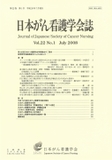Japanese
English
- 販売していません
- Abstract 文献概要
- 参考文献 Reference
- サイト内被引用 Cited by
要旨
本研究の目的は,死にゆくがん患者と家族員が,患者に死が訪れるまでの期間に,どのような相互作用をしているのかと相互作用の影響要因とを明らかにし,患者と家族員との相互作用を支え,末期の危機にある両者が日々の事柄にうまく対処していけるような看護援助を検討することである.ここでは相互作用を,患者と家族員が,さまざまな思いを抱きつつ,あらゆる形のやりとりによって,お互いの認知,感情,思考,行動に影響しあうさまと定義する.4組8名の患者と家族員を対象に,両者の間のやりとりや思いを中心に,参加観察法,面接法によって調査し,質的帰納的分析を行い,以下を明らかにした.
死にゆく患者と家族員との相互作用は,【互いの気遣いによる支えあい】,【互いの気遣いをめぐるすれ違い】,【互いに真実へ触れないことによる安定の保持】,【希望へ向けた取り組みによる支えあい】など8つであった.相互作用の影響要因は,家族の関係性,家族の対処機制など6つが導かれ,また相互作用の中心的意味の検討から,患者と家族員との結びつきを強める,両者の人間的成長が促される,両者の間の溝を深めうる,の3つの成りゆきが表された.
死にゆくがん患者と家族員が日々の事柄にうまく対処していくためには,両者の相互作用とその影響要因および成りゆきの関係性に着目し,相互作用を支える看護援助が重要である.
Abstract
The purpose of this study was to identify the type of interrelationships made between patients dying of cancer and members of their family, and factors influencing these interrelationships in the period between diagnosis and death, and to discuss the role of nursing care in supporting these interrelationships. Interrelationships are defined as the way patients and family members mutually influence recognition of the illness, mortality, feelings, thoughts, behaviors and family bonds.
Each participant gave informed consent to participate in the study. The participants were patients diagnosed with a terminal illness, with prognoses of less than one year, and family members who knew this information and had a close trusting relationship with them. We conducted participating observation and semi.structured interviews to assess communication between them. A qualitative inductive method was used to analyze the contents of the interrelationships and the factors influencing them.
The participants were 4 pairs of patients and their family members. All patients had been diagnosed with advanced gastrointestinal cancer, but were not aware of their exact prognoses. The types of interrelationships between the patients and their family members were classified into 8 themes. These interrelationships represented a situation in which patient and relative knew the patient's prognosis, and where both parties resolved to struggle with the disease and maintain a hopeful attitude, even when death was imminent. We identified 6 factors influencing interrelationships, including family affiliations and family coping mechanisms. These interrelationships produced 3 possible consequences: the connection between patient and relative strengthened, both parties achieved spiritual and emotional growth, or a communication gap between them widened.
It is necessary to offer individualized nursing care accounting for the 8 types of interrelationship and 6 influencing factors to enable patients with terminal cancer and their family members to achieve spiritual and emotional growth through close communication, and minimize the possibility of disrupting communications within the family.
Copyright © 2008, Japanese Society of Cancer Nursing All rights reserved.


